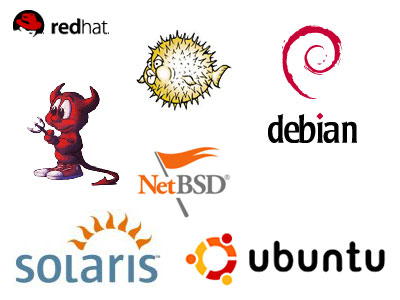A sad C day
I understand a lot of people were moved by the death of Steve Jobs, but IMHO a gianter (if that's a word) person of the computer world also died last week. Sadly, Dennis Ritchie died on the 12th October.
 While Steve gave us shiny toys (and yes, I am typing this on a MacBook, and I have an iPad), Ritchie gave us (well, me) some of the vital tools of the trade. With Ken Thompson, he developed the best operating system in the world, namely
While Steve gave us shiny toys (and yes, I am typing this on a MacBook, and I have an iPad), Ritchie gave us (well, me) some of the vital tools of the trade. With Ken Thompson, he developed the best operating system in the world, namely
Yes, UNIX. When I started my PhD, we used VMS on VAXes, but these were superseded by these beauties -
Sun machines running SunOS, my first experience of UNIX. Soon after, we had the birth of penguin, and we could have real computing in the home with Linux.
In the old days, we were spending a fortune on maintenance contracts for Vaxes and Sun machines, so the prospect of running a free proper operating system on cheap hardware was very appealing (and no, windows of any variety is not a proper operating system - good for games, but not for my research).
People realised that that you can string computers together to build cheap supercomputers and computational astrophysics forged ahead. Many of the spectacular cosmological simulations were run on such supercomputers.
But if that was not enough, Ritchie give us one more thing, the C programming language. I'm going to moan and gripe like an old man that students today don't know how to code, and perhaps they can get away with Python, but I'm a fan of basic languages, C and fortran, for coding in supercomputer environments (and I'm not going to get all religious on programming language).
However, I started to learn C from Ritchie's own book
While I now realise this is an excellent book, it is not the book to learn C from. Many times I ended up shouting at the book "Why!!! Oh why doesn't it work!!" Ah, the joy of being a research student. Thank you Dennis Ritchie :)

Yes, UNIX. When I started my PhD, we used VMS on VAXes, but these were superseded by these beauties -
Sun machines running SunOS, my first experience of UNIX. Soon after, we had the birth of penguin, and we could have real computing in the home with Linux.
In the old days, we were spending a fortune on maintenance contracts for Vaxes and Sun machines, so the prospect of running a free proper operating system on cheap hardware was very appealing (and no, windows of any variety is not a proper operating system - good for games, but not for my research).
People realised that that you can string computers together to build cheap supercomputers and computational astrophysics forged ahead. Many of the spectacular cosmological simulations were run on such supercomputers.
But if that was not enough, Ritchie give us one more thing, the C programming language. I'm going to moan and gripe like an old man that students today don't know how to code, and perhaps they can get away with Python, but I'm a fan of basic languages, C and fortran, for coding in supercomputer environments (and I'm not going to get all religious on programming language).
However, I started to learn C from Ritchie's own book
While I now realise this is an excellent book, it is not the book to learn C from. Many times I ended up shouting at the book "Why!!! Oh why doesn't it work!!" Ah, the joy of being a research student. Thank you Dennis Ritchie :)




See my comments over on Andy's blog: http://andyxl.wordpress.com/2011/10/17/goodbye-world/
ReplyDeleteBelieve it or not, VMS is still used quite a bit outside of academia. To say that VMS on VAX was superseded by unix is to compare apples and oranges (although many sysops were able to use such arguments to get management to buy them "cool" unix machines): it's easy to compare newer unix kit to older VMS kit. The fact that there is so much older VMS kit still around is a testimony to its quality. Of course, there is also newer VMS kit which is faster than older unix kit. Academic licenses for VMS are very cheap, and there is a hobbyist license for free. Quite respectable systems can be found for free if one looks for them (a 10-year-old VMS system which cost 100,000 pounds then is still quite respectable today (few GB RAM, say).
In Cambridge, the first SUN machines were bought as part of the HST project, and it was a time when a couple of students had some unix experience, so people started using them.
ReplyDeleteTo be honest, in astronomy, I think that VAX and SUN painted themselves into a corner with their large maintenance and licence fees. Linux came along at the right time, and as soon as we had research capable machines with free compilers, there was no looking back. Unix took hold, and won.